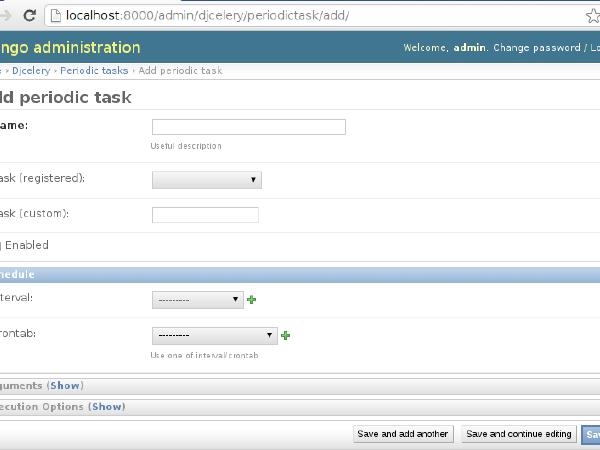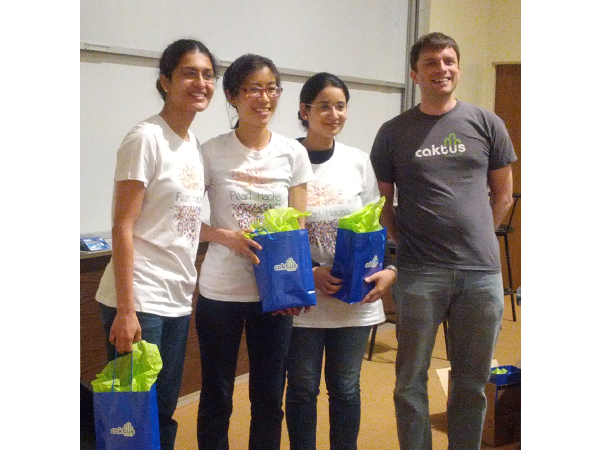Django
2014

Celery in Production
(Thanks to Mark Lavin for significant contributions to this post.)
In a previous post, we introduced using Celery to schedule tasks.
In this post, we address things you might need to consider when planning how to deploy Celery in production.

DjangoCon Ticket Giveaway!
Update: Congratulations to @dmpayton for winning this giveaway!
Caktus is giving away a DjangoCon ticket valued at $850! DjangoCon is the main US Django conference and it’s returning to Portland this year, August 30 - September 4th. Meet fellow Django developers, learn what others are doing, and have a good time!

OSCON 2014 & REST API Client Best Practices
Mark Lavin, Caktus Technical Director and author of the forthcoming LightWeight Django was recently at OSCON 2014 in Portland where he gave a talk on improving the relationship between server and client for REST APIs. OSCON, with over 3000 attendees, is one of the largest open source conferences around. I sat down with him to ask him about his time there.

Contributing Back to Symposion
Recently Caktus collaborated with the organizers of PyOhio, a free regional Python conference, to launch the PyOhio 2014 conference website. The conference starts this weekend, July 26 - 27. As in prior years, the conference web site utilizes Eldarion’s Symposion, an opensource conference management system. Symposion powers a number of annual conference sites including PyCon and DjangoCon. In fact, as of this writing, there are 78 forks of Symposion, a nod to its widespread use for events both large and small. This collaboration afforded us the opportunity to abide by one our core tenets, that of giving back to the community.

July 2014 ShipIt Day Recap
This past Friday we celebrated another ShipIt day at Caktus. There was a lot of open source contribution, exploring, and learning happening in the office. The projects ranged from native mobile Firefox OS apps, to development on our automated server provisioning templates via Salt, to front-end apps aimed at using web technology to create interfaces where composing new music or performing Frozen’s Let It Go is so easy anyone can do it.

O'Reilly Deal: 50% Off Lightweight Django
O'Reilly Media, the go-to source for technical books, just let us know that they're having a 50% off sale on eBook pre-orders of Lightweight Django today. Use coupon code: DEAL.

Getting Started Scheduling Tasks with Celery
UPDATE: A newer version of this blog post is available for Celery Version 5.0.x.
Getting Started Using Celery for Scheduling Tasks
Many Django applications can make good use of being able to schedule work, either periodically or just not blocking the request thread.

Caktus has a new website!
It’s been a few years since we last updated our website, and we gave it a whole new look!
With the new site, it’s easy to see just what services we offer, and our processes for bringing our client’s ideas to life. The new layout allows for more in-depth reviews of our projects, and also highlights our talented and growing team. We also wanted to share more information on our commitment to the open source community and social good. And the updated structure makes finding out about events and reading our ever-popular blog posts simple.

New for PyCon: App for Group Outings + Giant Duck
For PyCon 2014, we’ve been working for the past few months on Duckling, an app to make it easier to find and join casual group outings. Our favorite part of PyCon is meeting up with fellow Pythonistas, but without someone rounding everyone up and sorting the logistics, we’ve found it difficult to figure who’s going where and when. Our answer to this age-old conference conundrum is Duckling!

Congrats to PearlHacks Winners (Including Our Intern, Annie)!
Caleb Smith, Caktus developer, awarding the third place prize to TheRightFit creators Bipasa Chattopadhyay, Ping Fu, and Sarah Andrabi.
Many congratulations to the PearlHacks third place winners who won Sphero Balls! The team from UNC’s Computer Science department created TheRightFit, an Android app that helps shoppers know what sizes will fit them and their families among various brands. Their prize of Sphero Balls, programmable balls that can interact and play games via smart phones, was presented by Caktus developer and Pearl Hacks mentor Caleb Smith as part of our sponsorship. PearlHacks, held at UNC-Chapel Hill, is a conference designed to encourage female high school and college programmers from the NC and VA area.